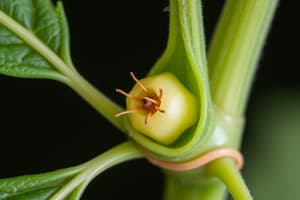Podcast
Questions and Answers
What tag color is provided for breeder seed?
What tag color is provided for breeder seed?
- Golden yellow (correct)
- Green
- White
- Blue
Which of the following is NOT a seed class defined by AOSCA?
Which of the following is NOT a seed class defined by AOSCA?
- Foundation seed
- Commercial seed (correct)
- Nuclear seed
- Breeder seed
What is the primary role of the father of seed technology, Dr. Robb Fraley?
What is the primary role of the father of seed technology, Dr. Robb Fraley?
- Improving seed characteristics (correct)
- Seed certification
- Seed testing
- Seed pathology
What is the main purpose of seed production?
What is the main purpose of seed production?
Which type of seed is produced directly by the breeder before further multiplication?
Which type of seed is produced directly by the breeder before further multiplication?
Who is recognized as the father of seed testing?
Who is recognized as the father of seed testing?
What is the genetic purity of breeder seeds?
What is the genetic purity of breeder seeds?
What type of seeds have the endosperm that persists until maturity?
What type of seeds have the endosperm that persists until maturity?
What is the seed tag color for breeder seeds?
What is the seed tag color for breeder seeds?
Which of the following examples represents a non-endospermic monocot?
Which of the following examples represents a non-endospermic monocot?
Which structure develops from the outer integument of an ovule?
Which structure develops from the outer integument of an ovule?
Which seed type has the highest genetic purity?
Which seed type has the highest genetic purity?
Which seed type is produced by progressive farmers under supervision?
Which seed type is produced by progressive farmers under supervision?
Which appendage is associated with the seed of Paddy?
Which appendage is associated with the seed of Paddy?
What is the physical purity percentage of foundation seeds?
What is the physical purity percentage of foundation seeds?
What type of germination allows the cotyledons to remain below ground while the epicotyl elongates?
What type of germination allows the cotyledons to remain below ground while the epicotyl elongates?
What is the main function of the seed coat?
What is the main function of the seed coat?
Certification is required for which type of seed?
Certification is required for which type of seed?
Which of the following is a characteristic of exalbuminous seeds?
Which of the following is a characteristic of exalbuminous seeds?
What is the seed tag size for certified seeds?
What is the seed tag size for certified seeds?
Which is true about nucleus seeds?
Which is true about nucleus seeds?
Which type of seed classification categorizes seeds based on their endosperm?
Which type of seed classification categorizes seeds based on their endosperm?
Which of the following options correctly identifies a method of pollen dissemination?
Which of the following options correctly identifies a method of pollen dissemination?
What is the primary role of the antipodal cells in the embryo sac?
What is the primary role of the antipodal cells in the embryo sac?
What type of seed germination is characterized by the cotyledons remaining buried in the soil?
What type of seed germination is characterized by the cotyledons remaining buried in the soil?
Which type of seeds would be classified as recalcitrant?
Which type of seeds would be classified as recalcitrant?
During fertilization in angiosperms, how many male nuclei participate?
During fertilization in angiosperms, how many male nuclei participate?
Which of the following is NOT a type of pollen dissemination method?
Which of the following is NOT a type of pollen dissemination method?
What is the minimum genetic purity required for Foundation seed?
What is the minimum genetic purity required for Foundation seed?
Which crop has a minimum physical purity requirement of 95%?
Which crop has a minimum physical purity requirement of 95%?
Which of the following crops requires a pure seed percentage of 98%?
Which of the following crops requires a pure seed percentage of 98%?
Which of the following is designated as an inseparable other crop seed for Barley?
Which of the following is designated as an inseparable other crop seed for Barley?
What is the minimum physical purity percentage for the crop Groundnut?
What is the minimum physical purity percentage for the crop Groundnut?
Which seed class has the highest genetic purity requirement?
Which seed class has the highest genetic purity requirement?
What percentage of pure seed is required for soybean?
What percentage of pure seed is required for soybean?
What is the primary purpose of the buff color seed tag?
What is the primary purpose of the buff color seed tag?
Which category of seed production has a higher isolation distance requirement?
Which category of seed production has a higher isolation distance requirement?
What distinguishes orthodox seeds from recalcitrant seeds?
What distinguishes orthodox seeds from recalcitrant seeds?
In seed production, what is a key characteristic of hybrid seed production compared to varietal seed production?
In seed production, what is a key characteristic of hybrid seed production compared to varietal seed production?
Which size is associated with certified seed production based on the tag specifications?
Which size is associated with certified seed production based on the tag specifications?
What type of seed care is typically required for hybrid seed production?
What type of seed care is typically required for hybrid seed production?
What is a common characteristic of seeds produced under a breeder seed system?
What is a common characteristic of seeds produced under a breeder seed system?
Which type of seed cannot undergo dormancy and loses viability quickly when dried?
Which type of seed cannot undergo dormancy and loses viability quickly when dried?
What financial aspect is generally associated with hybrid seed production?
What financial aspect is generally associated with hybrid seed production?
For which type of seed production is seed changed every generation?
For which type of seed production is seed changed every generation?
Flashcards are hidden until you start studying
Study Notes
Seed Structure
Embryo
- Immature plant that develops into a new plant under suitable conditions.
- Monocots possess one cotyledon; dicots usually have two cotyledons; gymnosperms can have two or more.
- Monocot Examples: Wheat, corn, rice, sugarcane, palm.
- Dicot Examples: Peas, beans, tomatoes, oak.
Endosperm
- Albuminous Seeds: Endosperm persists at maturity, found mainly in monocots.
- Exalbuminous Seeds: Endosperm consumed during seed development, found in most dicots.
- Endospermic Monocots: Maize, barley, rice.
- Non-endospermic Seeds in Dicots: Peas, lentils, sunflower.
- Reserved food: Carbohydrates in cereals, proteins in legumes, fats in castor and peanuts.
Seed Coat
- Comprised of two layers: outer layer (Testa) and inner layer (Tegmen).
- Protects embryo from injury and drying.
- Unitegmic Ovules: Single integument.
- Bitegmic Ovules: Two integuments; seed coat may derive from both.
Appendages of Seed
- Awn: Paddy.
- Hilum: Pulses.
- Caruncle: Castor, tapioca.
- Aril: Nutmeg.
- Wings: Moringa.
Germination Classification
- Hypogeal Germination: Epicotyl elongates, cotyledons below ground. Examples include gram, maize, coconut.
Seed Technology
- Involves methods for improving genetic and physical characteristics of seeds.
- Key figures: Dr. Robb Fraley (Father of Seed Technology), Frederick Nobbe (Seed Testing), Paul Neergaard (Seed Pathology).
Classes of Seed
- Nuclear Seed: Initial seed for variety development; genetic purity 100%.
- Breeder Seed: Progeny of nuclear seed; 100% genetic purity.
- Foundation Seed: Produced from breeder seeds; 99.5% genetic purity.
- Certified Seed: Progeny of foundation seeds; 99% genetic purity.
Characteristics of Good Quality Seed
Genetic Purity
- True to type and consistent with breeder's defined traits.
- Breeder/Nucleus: 100%, Foundation: 99.5%, Certified: 99%.
Physical Purity
- Composition of seed lots; should be maintained at 96-98%.
- Minimum standards for crops vary; e.g., carrot 95%, okra 99%.
Pure Seed Percentage
- Bhindi: 99%, other crops: 98%, soybean and jute: 97%.
Other Crop Seed Designation
- Barley, wheat, and oats must be free from other crop seeds.
Classification of Seeds
- By Usage: Cereals, oil seeds, pulses, vegetables.
- By Cotyledons: Monocots and dicots.
- By Endosperm Type: Endospermic (cereals) vs. Non-endospermic (legumes).
- By Germination Type: Hypogeal vs. Epigeal.
- By Storage Behavior: Orthodox and recalcitrant seeds.
Pollination
- Pollen transfer can be self-pollinated (autogamy) or cross-pollinated (allogamy).
- Pollination mechanisms include:
- Wind (anemophily),
- Water (hydrophily),
- Insects (entomophily),
- Birds (ornithophily).
Fertilization
- Fusion of male and female gametes forms an embryo.
- Embryo sacs consist of 7 cells and 8 nuclei.
Seed Production and Certification
- Seed Types Definition: Genetic purity and tag color indicate seed class.
- Nucleus Seed: 100% purity, buff tag.
- Breeder Seed: 100% purity, golden yellow tag.
- Foundation Seed: 99.5% purity, white tag.
- Certified Seed: 99% purity, azure blue tag.
Generation System of Seed Multiplication
- Includes three generations: Breeder, Foundation, Certified.
- Varietal production requires a single parent; hybrid production needs multiple parents with more stringent care.
Seed Types Based on Storage Behavior
Orthodox Seeds
- Viable long-term in low temperature with low moisture.
- Tolerant of freezing and dehydration; allows dormancy.
Recalcitrant Seeds
- Quickly lose viability below 12% moisture.
- Sensitive to freezing; unable to undergo dormancy; important for in-situ conservation.
Studying That Suits You
Use AI to generate personalized quizzes and flashcards to suit your learning preferences.




